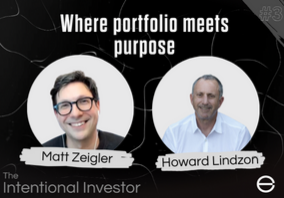So I got that goin’ for me
To learn more about Epsilon Theory and be notified when we release new content sign up here. You’ll receive an email every week and your information will never be shared with anyone else.
Continue the discussion at the Epsilon Theory Forum
12 more replies
The Latest From Epsilon Theory
This commentary is being provided to you as general information only and should not be taken as investment advice. The opinions expressed in these materials represent the personal views of the author(s). It is not investment research or a research recommendation, as it does not constitute substantive research or analysis. Any action that you take as a result of information contained in this document is ultimately your responsibility. Epsilon Theory will not accept liability for any loss or damage, including without limitation to any loss of profit, which may arise directly or indirectly from use of or reliance on such information. Consult your investment advisor before making any investment decisions. It must be noted, that no one can accurately predict the future of the market with certainty or guarantee future investment performance. Past performance is not a guarantee of future results.
Statements in this communication are forward-looking statements. The forward-looking statements and other views expressed herein are as of the date of this publication. Actual future results or occurrences may differ significantly from those anticipated in any forward-looking statements, and there is no guarantee that any predictions will come to pass. The views expressed herein are subject to change at any time, due to numerous market and other factors. Epsilon Theory disclaims any obligation to update publicly or revise any forward-looking statements or views expressed herein. This information is neither an offer to sell nor a solicitation of any offer to buy any securities. This commentary has been prepared without regard to the individual financial circumstances and objectives of persons who receive it. Epsilon Theory recommends that investors independently evaluate particular investments and strategies, and encourages investors to seek the advice of a financial advisor. The appropriateness of a particular investment or strategy will depend on an investor’s individual circumstances and objectives.









Brilliant writing and analysis Rusty. Hard to believe that you are raising your already incredibly high bar. Best explanation of the meta game around buybacks I’ve read - well done.
Plus 1…even I understood Rusty’s explanation and I’m the slowest of the pack members.
Correct me if I’m wrong but buybacks sole purpose seem to be to return capital while avoiding taxes(unlike dividends). Unless I misunderstand (please tell me how, I probably am), this doesn’t seem like just a meta game fail, but just a loosing argument.
Hmmm, I believe the record shows that, on average, corporate management buys back shares at the highs and issues shares at the lows.
Rusty, I get you point and do desire freedom vs regulatory control but help me understand why this isn’t corporate malfeasance?
So the million-dollar question – how do we root out the raccoon boards/management?
Attempting to invest based on governance gets you into ESG territory (which has all of the charm noted in Demonetized’s Kobayashi Maru note).
The voices on either side of the debate are louder and have far more Twitter followers than most of us will ever have, so a publicity push seems hard.
The math does work, and in the case of executive X using buybacks to “beat” estimates and increase share price, other shareholders benefit, making the broad-based shareholder pushback difficult.
How do we fight the raccoons without using the Fatcat Executive, Ban Buybacks narrative?
It certainly doesn’t make the argument more compelling, However, if the buy-backs were at least sourced from productive activities, you could argue that there is some broader societal benefit at play (R&D, better/cheaper stuff, employment, something). When it’s just an empty game…the argument is as you point out awful.
I’ve seen datasets and analyses which, depending on assumptions, horizons, etc. show very different outcomes for buyers-back. But let’s accept your premise as a given. Even so, bad decisions alone aren’t malfeasance. And outside of compensated related maybe-kinda-sorta malfeasance, there isn’t an appreciable monetary difference between buybacks and dividends, so what we’re really talking about here is separate from what they are - it’s how they’re able to be used. They have the appearance of something more sinister, aided by the reality of their use in immunizing non-cash comp, and that’s what’s got regulators’ hackles up.
I’m not 100% sure that I follow you, Michal. What is the losing argument you’re referring to, and on whose part?
Thanks, Mark!
Totally fair question. What do you think?